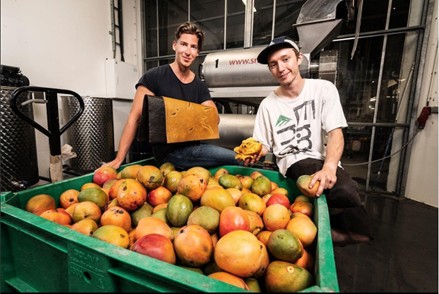More than half of the mangoes in Europe are imported into or traded by the Netherlands, but many are unfit for sale and thrown away. Since 2015, two Dutch youngsters, Hugo de Boon and Koen Meerkerk, both aged 27, have found a solution to prevent food waste: mango-based leather.
With “Climate Action” the Sustainable Development Goal of the Month for November, UNRIC interviewed Fruitleather’s two founders.
A product with great potential
The idea behind Fruitleather came about by coincidence during Hugo and Koen’s studies at an art academy. As part of an assignment, the duo chose to turn fruit waste from Rotterdam market into a natural pigment. “After the extraction of the pigments, we happened to leave some pulp on the windowsill and it turned into a hard piece of material (…) with potential to create a product with leather-like properties,” de Boon says.
The Netherlands is the second-largest importer of mangoes in the world, with Rotterdam as a transit port. Fruitleather therefore has a large amount of raw material at its disposal. Every week, the organization collects around 1,000 kilos of mangoes to turn into leather.
Creatively combatting food waste

“There are food shortages all over the world, while people in countries like the Netherlands reject food based on its aesthetics. We try to show people that anything can still have value, as long as you do something with it,” de Boon explains.
The leather produced by their company can be used to produce shoes, handbags and other accessories.
Besides reducing food waste, Hugo and Koen also look at the additional environmental benefits of their product: less pollution and fewer greenhouse gas emissions. In traditional leather production, chemicals are used that can be toxic to humans and the environment. Raising cattle also generates methane emissions, a greenhouse gas.
Use more fruit, create less waste
According to the Food and Agriculture Organization of the United Nations (FAO), about 14% of the food produced in the world is lost between harvest and retail, while an estimated 17% of total global food production is wasted.
“This is just the tip of the iceberg. In the future, we hope to collect tonnes of fruit waste every day,” says de Boon, who also wants to process other types of fruit into a sustainable product.
The two young Dutchmen are looking further than the Netherlands to make a difference. “The goal is to expand our activities and work directly in the mango-producing countries to have an even greater impact,” de Boon concludes.
The inclusion of an organization in the United Nations Regional Information Centre (UNRIC) does not reflect the views of UNRIC and does not imply its endorsement.
Read more :
- Do you want to take action too? Join the UN Act Now campaign
- Discover UNRIC’s new climate Go-Goals game for kids and adults!
- Learn more about the SDGs and COP26
- International Year of Fruits and Vegetables 2021
- Learn more about World Food Day
- International Day of Awareness on Food Loss and Waste Reduction




